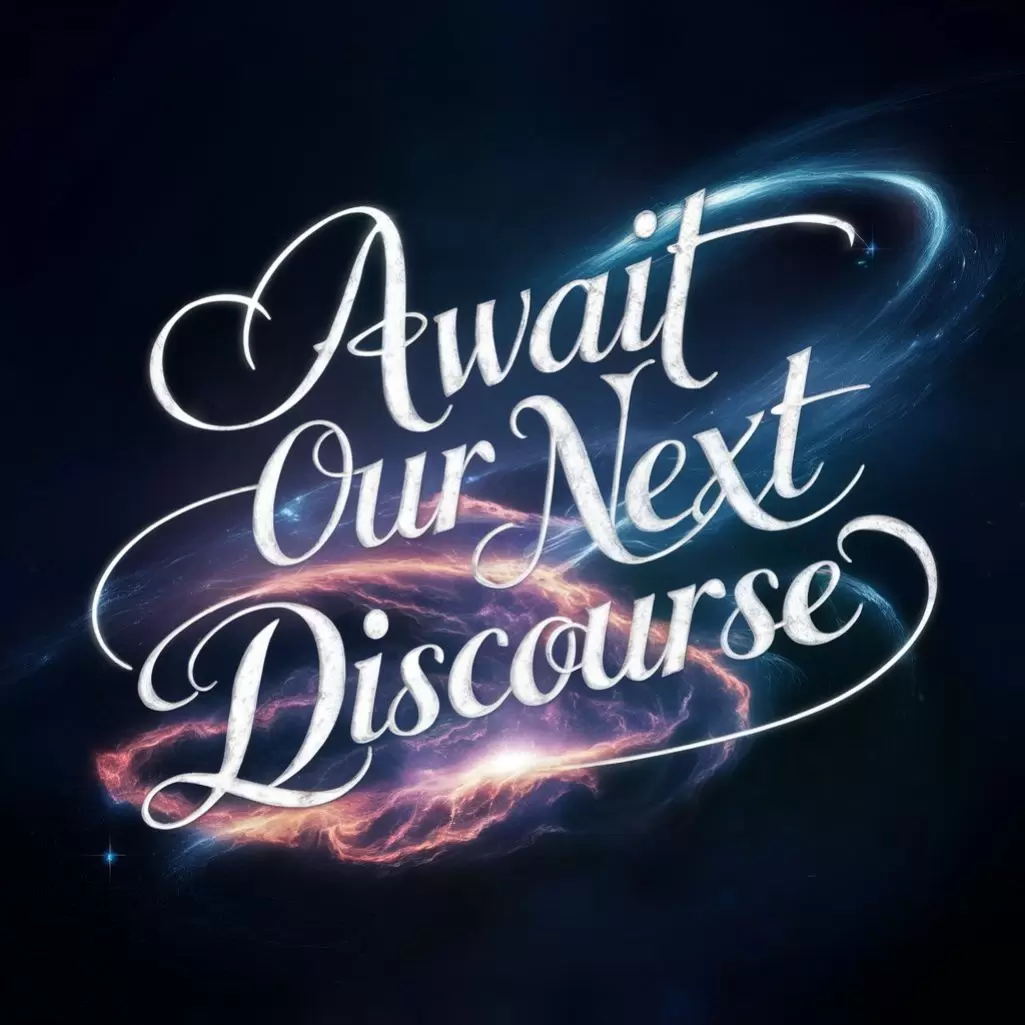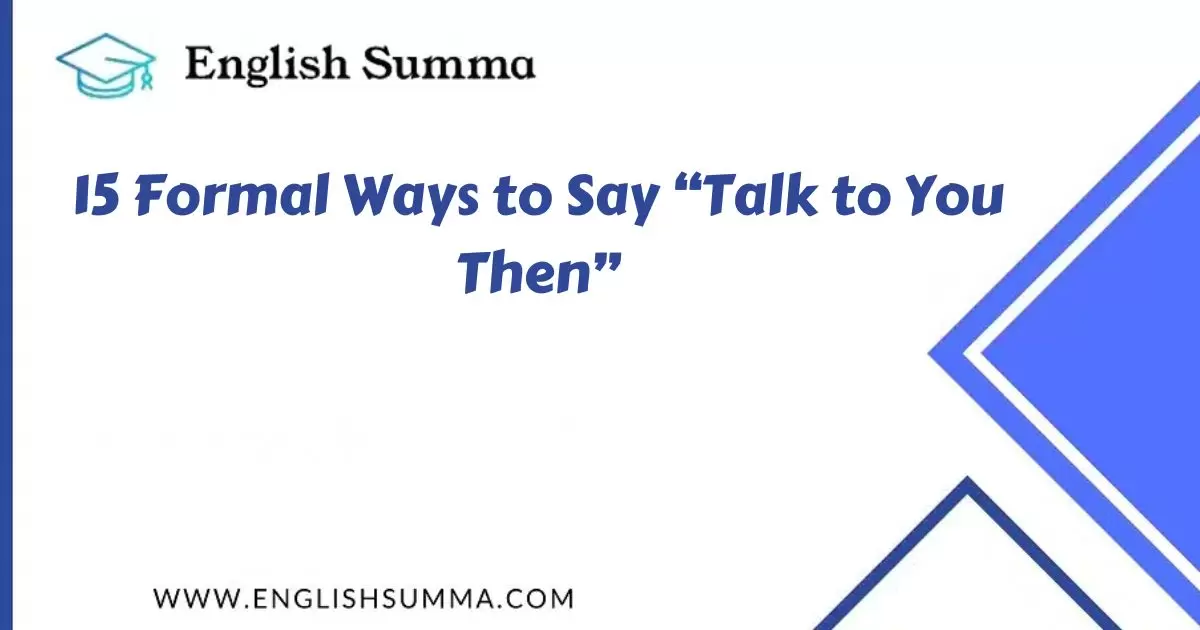In the realm of professional communication, the choice of language and tone carries significant weight, shaping not only the message itself but also the dynamics of relationships and interactions.
Among the myriad expressions used to denote the conclusion of a conversation or the anticipation of future dialogue, “Talk to you then” stands as a common yet versatile phrase. However, in certain contexts, a more formal and refined approach may be warranted to convey respect, professionalism, and clarity.
In this article, we delve into 15 formal alternatives to “Talk to you then,” exploring their nuances, implications, and appropriate usage. Through scenario examples and additional insights, we aim to equip readers with a diverse repertoire of linguistic tools, empowering them to navigate professional discourse with poise and precision.
Whether engaging in email correspondence, business meetings, or networking events, mastering the art of formal communication is essential for fostering positive relationships, facilitating collaboration, and achieving professional success.
1. Until Our Next Conversation
Scenario:
Subject: Re: Proposal Discussion
Dear Daniel,
Thank you for our recent discussion regarding the upcoming project proposal. I found our conversation to be insightful and productive. Until our next conversation, I will review the key points we covered and work on incorporating your feedback into the proposal draft.
Best regards,
Adam Evans
2. Let’s Reconnect at a Later Time

Scenario:
Subject: Follow-up Meeting
Dear Daniel,
I appreciate the opportunity to discuss the marketing strategy for our new product line. Let’s reconnect at a later time to delve deeper into the market research findings and explore potential avenues for expansion.
Warm regards,
Adam Evans
Read More: Professional Ways to Say “Thank You for Your Cooperation”
3. I Anticipate Our Future Discussions
Scenario:
Subject: Weekly Check-In
Dear Daniel,
Thank you for our call earlier today. I anticipate our future discussions as we work towards achieving our project milestones. Your insights are invaluable to our team’s success.
Best regards,
Adam Evans
4. Until We Speak Again
Scenario:
Subject: Follow-up on Action Items
Dear Daniel,
It was a pleasure speaking with you about the upcoming client presentation. Until we speak again, I will finalize the slides and ensure that all action items are addressed.
Warm regards,
Adam Evans
5. Looking Forward to Our Next Dialogue
Scenario:
Subject: Follow-up Discussion
Dear Daniel,
Thank you for the productive dialogue during yesterday’s team meeting. Looking forward to our next dialogue, where we can further brainstorm solutions to the challenges we face.
Best regards,
Adam Evans
6. Until Our Next Interaction
Scenario:
Subject: Follow-up from Conference Call
Dear Daniel,
I appreciate the opportunity to connect with you and discuss the quarterly performance metrics. Until our next interaction, I will analyze the data further and prepare a comprehensive report for our team.
Warm regards,
Adam Evans
7. Let’s Reconvene When Appropriate
Scenario:
Subject: Next Steps Discussion
Dear Daniel,
Thank you for the insightful conversation about streamlining our workflow processes. Let’s reconvene when appropriate to evaluate the implementation progress and address any challenges that may arise.
Best regards,
Adam Evans
8. I Await Our Next Discourse

Scenario:
Subject: Follow-up Meeting Arrangements
Dear Daniel,
It was a pleasure discussing the upcoming project timelines with you earlier today. I await our next discourse to finalize the resource allocation and project milestones.
Warm regards,
Adam Evans
9. Until Our Paths Cross Again
Scenario:
Subject: Re: Networking Event
Dear Daniel,
Thank you for attending the networking event yesterday. It was a pleasure catching up with you. Until our paths cross again, I look forward to staying connected and exploring potential collaboration opportunities.
Best regards,
Adam Evans
10. Let’s Pick This Up at a Later Date
Scenario:
Subject: Follow-up on Research Meeting
Dear Daniel,
Thank you for your insights during our discussion about the market trends. Let’s pick this up at a later date to review the additional research findings and determine our strategic approach.
Warm regards,
Adam Evans
11. Until Our Next Exchange of Ideas
Scenario:
Subject: Brainstorming Session Follow-up
Dear Daniel,
Your contributions during today’s brainstorming session were invaluable. Until our next exchange of ideas, I will compile our notes and circulate them to the team for further review.
Best regards,
Adam Evans
12. I’ll Await Our Next Opportunity to Converse
Scenario:
Subject: Follow-up on Client Meeting
Dear Daniel,
Thank you for joining the client meeting earlier today. I’ll await our next opportunity to converse to address any follow-up questions from the client and discuss potential next steps.
Warm regards,
Adam Evans
13. Until We Meet Again for Conversation
Scenario:
Subject: Follow-up on Training Session
Dear Daniel,
I appreciate your participation in yesterday’s training session. Until we meet again for conversation, I encourage you to reach out if you have any further questions or require additional support.
Best regards,
Adam Evans
14. Looking Forward to Our Future Correspondence
Scenario:
Subject: Follow-up on Email Discussion
Dear Daniel,
Thank you for your prompt response to my email regarding the project timeline. Looking forward to our future correspondence, where we can address any outstanding issues and keep the project moving forward.
Warm regards,
Adam Evans
15. Let’s Continue This Discussion in the Future
Scenario:
Subject: Follow-up from Team Meeting
Dear Daniel,
It was great to have you participate in today’s team meeting. Let’s continue this discussion in the future to explore innovative solutions to the challenges we face.
Best regards,
Adam Evans
Pros and Cons of Formal Communication
Formal communication has its advantages and disadvantages in professional settings.
Pros:
- Clarity: Formal language ensures clear and precise communication, reducing the likelihood of misunderstandings.
- Professionalism: Formality conveys respect and professionalism, enhancing the overall tone of interactions.
- Structure: Formal communication often follows established conventions, providing a structured framework for discussions and decision-making.
- Respect: Using formal language demonstrates respect for colleagues and stakeholders, fostering positive working relationships.
- Documentation: Formal communication can serve as documentation for agreements, decisions, and action items, aiding in accountability and follow-up.
Cons:
- Stiffness: Overly formal language can come across as stiff or impersonal, inhibiting genuine rapport and camaraderie.
- Time-consuming: Crafting formal communications may require more time and effort than informal exchanges, potentially slowing down decision-making processes.
- Barrier to Understanding: Complex formal language may pose a barrier to understanding for some recipients, especially those with limited proficiency in the language.
- Lack of Flexibility: Formal communication may lack the flexibility to adapt to dynamic or evolving situations, leading to rigidity in interactions.
- Perceived Distance: Excessive formality can create a perception of distance or hierarchy, hindering open and collaborative communication within teams.
Conclusion
In conclusion, mastering the art of formal communication offers numerous benefits in professional settings Ranging from clarity and professionalism to structure and respect. By employing formal language, individuals can ensure that their messages are conveyed with precision and gravitas, thereby minimizing the risk of misunderstandings and fostering productive interactions.
Furthermore, formal communication serves as a documentation tool, providing a clear record of agreements, decisions, and action items, which is crucial for accountability and follow-up. However, it’s important to acknowledge the potential drawbacks of excessive formality, such as perceived stiffness, time-consumption, and barriers to understanding.
Striking the right balance between formality and accessibility is key to fostering genuine rapport and effective collaboration within teams. Ultimately, by harnessing the power of formal communication while remaining mindful of its limitations, individuals can navigate professional landscapes with confidence and integrity, facilitating meaningful dialogue and driving collective success.

